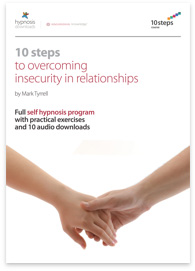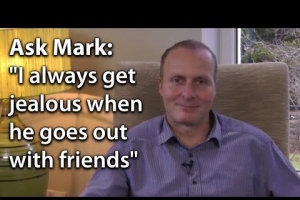Do Your Relationships Damage Your Self-Esteem? (And what to do about it)
7 tips to make your relationship a self-esteem-boosting one
 "Do Your Relationships Damage Your Self-Esteem? (And what to do about it)" courtesy of JonDissed
"Do Your Relationships Damage Your Self-Esteem? (And what to do about it)" courtesy of JonDissedYour self-esteem shouldn't be totally dependent on the person with whom you happen to be in a relationship. But the fact is, relationships do have a big impact on the way you feel. And that includes the way you feel about yourself.
Mick's relationship felt like a real burden to him. But it was a burden to which he'd become so accustomed, he didn't even know he'd been carrying it until he spoke to me and was able to lay down the load for a while. The pain of relationships that aren't working can become like a background ache; we don't notice they hurt because we've grown so used to the discomfort.
How's your self-esteem? How's your relationship? The two can be more intertwined than we realize. As soon as I suspected Mick's relationship might be having an impact on his self-esteem, I asked him a question that really made him think:
"What should a healthy relationship provide for the people in it?"
Prefer to watch instead?
Why Mick cried
"Self-esteem is important..." Mick was tentative, shy, and uncertain as he described what a good relationship should be. He began to look sad and his eyes moistened.
"The person you are with should care about you - and let you know that they care. They should be affectionate, build you up. Focus on your strengths. Be honest when you screw up but still treat you with respect and, of course, you should do the same for them."
Sounds simple, doesn't it? By focussing on what should be in a healthy, mutually supportive relationship, it was brought home to Mick what he didn't have in his relationship - which is why he became tearful.
But my job isn't to make people feel bad ; quite the reverse! So once we'd established what Mick and his wife Louise didn't have together, we set about building ways to help them both meet their needs within their relationship.
Self-esteem building in relationships
Mick was genuinely stunned on the rare occasions when someone would actually comment on the way his wife spoke to him: "How can you let her speak to you like that, mate?" He was really surprised when people would suggest that he do himself a favour and move on, or tell him determinedly that there wa s no way they themselves would ever put up with that!
"You should hear the way she talks to me sometimes, Mark. I'm reminded of Basil Fawlty in the famous sitcom replying to an extremely rude guest: 'I'm sorry, were you talking to me ? I thought there was a dog in the room!'
The weirdest thing is that I just don't seem to notice it. It's come to feel normal."
I asked him if he felt better about himself, more or less confident now than before he'd met Louise? To me he seemed diffident, unsure – afraid, even.
"Well, now that you mention it, I do remember feeling more confident, like I had more self-esteem back before we got serious. We had fun and, yes, we both felt great about ourselves and each other. But, bit by bit, it's all gone wrong."
I worked hypnotically with Mick to help him rehearse new patterns of behaviour to increase his self-confidence; but we also worked on some very practical strategies to help change the way he and Louise related to each other. You'll find some of what we did in these relationship self-esteem boosting tips:
1) Define just how your partner is undermining your self-esteem
"To vanquish the beast, we must know the beast." I'm not sure who said that, but I'm sure somebody did. If your partner routinely makes you feel bad about yourself (which may be because they never actively encourage you to feel good about yourself), then think about exactly why this is.
For example, do they:
- Never compliment you?
- Put you down?
- Always seem to put you last?
- Scorn or laugh at your dreams and aspirations?
- Constantly wax lyrical about the attractions of other men or women?
- Make disparaging remarks about you in company?
- Seem disinterested in you ?
Any long-term relationship may contain some of these elements some of the time; but, as we know, when the bad times start to outnumber the good, a relationship is inevitably headed for trouble (1).
So write down what your partner is doing and not doing that seems to be damaging your self-esteem. Don't look for reasons; just what is happening.
Next...
2) Look to yourself
"It's just that she seems so resentful!" Mick described how Louise would make sour remarks about him even in front of his and her friends.
"Why would Louise be resentful? How do you treat her?"
He had to admit that he had "stopped bothering", that he rarely said anything positive or complimentary to her. He maintained that he didn't actively criticize her the way she did him, but he was fair-minded enough to see that he had "stopped being nice to her".
It's not that our partners should always back us up or support us (even when we're being rude or mean), but there needs to be a general back ground sense that they're (essentially) supportive of you as a person. They had both lost this sense.
The next tip can feel hard at first.
3) Re-establish self-esteem in relationships by ditching the blame game
Sure, Louise had no right to talk to Mick the way she did and he felt that because of the way she was to him...well...why should he ever bother with her ? Egg before chicken, stalemate —
"Your move!"
"I think not, my friend. I didn't start this!"
Oh, dear.
But, if you change one part of a system - and yes, a relationship can be viewed as a system (who said romance was dead) - then the whole system has to change. The quickest way to change the dynamic of a relationship is to change what you do in that relationship.
4) Change one part and the whole relationship changes
I suggested to Mick we needed to "prove" that Louise really was the main cause of his rapidly shrivelling self-esteem. He agreed, then resolved to begin actively saying complimentary things to her over the coming week; to focus on her strengths, regardless of how she was to him. It was going to be tough, but he'd do it.
The next week he said: "You know, it was strange, Mark. I said nice things to her, I encouraged her and focussed on her strengths and you know what? She still put me down, criticized, even laughed at me. But it was like she was going through the motions through sheer force of habit. She seemed more upset somehow, more sad. Like she wanted to be nice but didn't know how!"
I suggested that she wouldn't change over night, but this may be the pattern of self-esteem bashing "loosening", changing. And, as it turned out over the coming weeks, she began to soften and they started to grow closer again.
But someone had to start this process off. By complimenting her, Mick was actually demonstrating her own behaviour back to her. Not by pointing it out to her (she would have just argued), but by letting her unavoidably see how different she was behaving toward him than he was now being to her.
I know it's more fun to blame than to stand back and look at your part. And, after all, maybe you really don't have much of a part in all this. Perhaps your partner is naturally controlling, manipulative, and seeks to build themselves up by putting you down. That's possible; but it's always worth examining the way you've been relating to your partner as well as the reverse.
So let's go back to that. Does your partner possibly have a vested emotional interest in making you feel bad about yourself?
5) Think about what motivates your partner to crush your self-esteem
Ever heard of a 'feeder'? This is a term for a man who purposefully and often secretly adds calories to his woman's diet in order to get and keep her fat - and, thus, keep her. Men may feel that whilst their girlfriends or wives are fat, they won't run off with another man because:
- Other men won't be attracted to them (although, of course, some men do like fat women).
- The woman will feel so lacking in confidence she'll count herself lucky to have any man (him).
Someone who constantly puts you down, tries to blunt your self-confidence, and dents your self-esteem may be consciously (or, we must concede, even unconsciously) trying to keep you attached to them by telling you such things as:
- "Who else would want you?!"
- "You're lucky you met me!"
- "I have lots of people interested in me!"
- "I could have married so -and -so and sometimes I wish I did!"
Do you suspect your partner is attempting to bolster their own self-esteem by trying to damage yours? If so, see this for what it is: a reflection on them, not you.
6) Look elsewhere to bolster your self-esteem
No, I'm not suggesting you have an affair. Although actually, affairs are often not just about sex. Unless someone is a serial adulterer, they usually happen for a reason.
Both men and women may 'stray ' if they find someone who gives them what they need but haven't been getting - just as plants and flowers will lean toward a source of sunlight or moisture when these requirements have been lacking.
What I am saying is, get a wider view of yourself. I asked Mick to list the three main criticisms his wife routinely levelled at him. He responded that he was fat, lazy, and un-ambitious. He really had come to believe this was an accurate description of who he was. I then got him to ask five trusted friends to comment honestly on how they saw him.
They said things like: "You're heavier than you were twenty years ago, but you're in much better shape than most men your age." One even said how his wife was always commenting on how hard Mick worked and how gifted he was at DIY in the home. And another stated that Mick had built himself up over the years in his career and had showed tremendous perseverance and ambition. These views were an absolute revelation to Mick, as he really had swallowed all the relationship brainwashing ...
Spend time with friends and relatives who don't have a vested interest (even if that interest is comprised of resentment) in putting you down, but rather help make you feel better about yourself. This will serve to help balance your self-esteem.
7) Confront your partner
People often don't know what they are like; it can come as a real shock. Just as Mick was shocked to learn that his friends didn't view him as an elephantine, blundering, slothful fool (as his wife seemed to), so too can some people really not know how obnoxious, dismissive, undermining, and self-esteem destroying they are being. They may dismiss it as "only joking" or "you know I love you, really!" (even though I haven't treated you at all well for years).
Mick started to ask Louise why she had ever agreed to date him all those years ago. She used this as an excuse to compare how he was then to how he was now. He told her how his friends felt differently about him than she seemed to. She replied that they didn't really know him; she was the one who "had to suffer living with him." He told her he still loved her, but would leave her and find someone who loved him if things didn't change.
At that, she cried and, at last, started to make efforts of her own.
10 Steps to Overcome Insecurity in Relationships course
Despite how much you love your partner, are you worried you're driving them away?...
References
- According to Dr John Gottman, author of Why Marriages Succeed or Fail and famed psychological researcher into what makes relationships work or not work, stable relationships need five good interactions for every not-so-good one. 'Good' could mean a loving hug, a fun afternoon spent together, or a nice chat about a movie - anything positive. A 'bad' interaction may be a row, disagreement, or disappointment.







